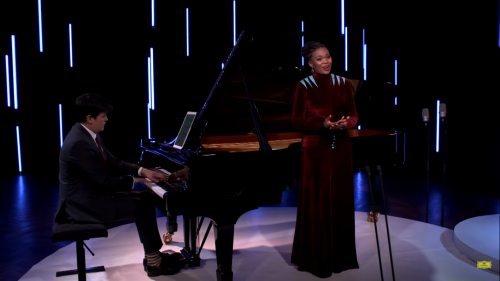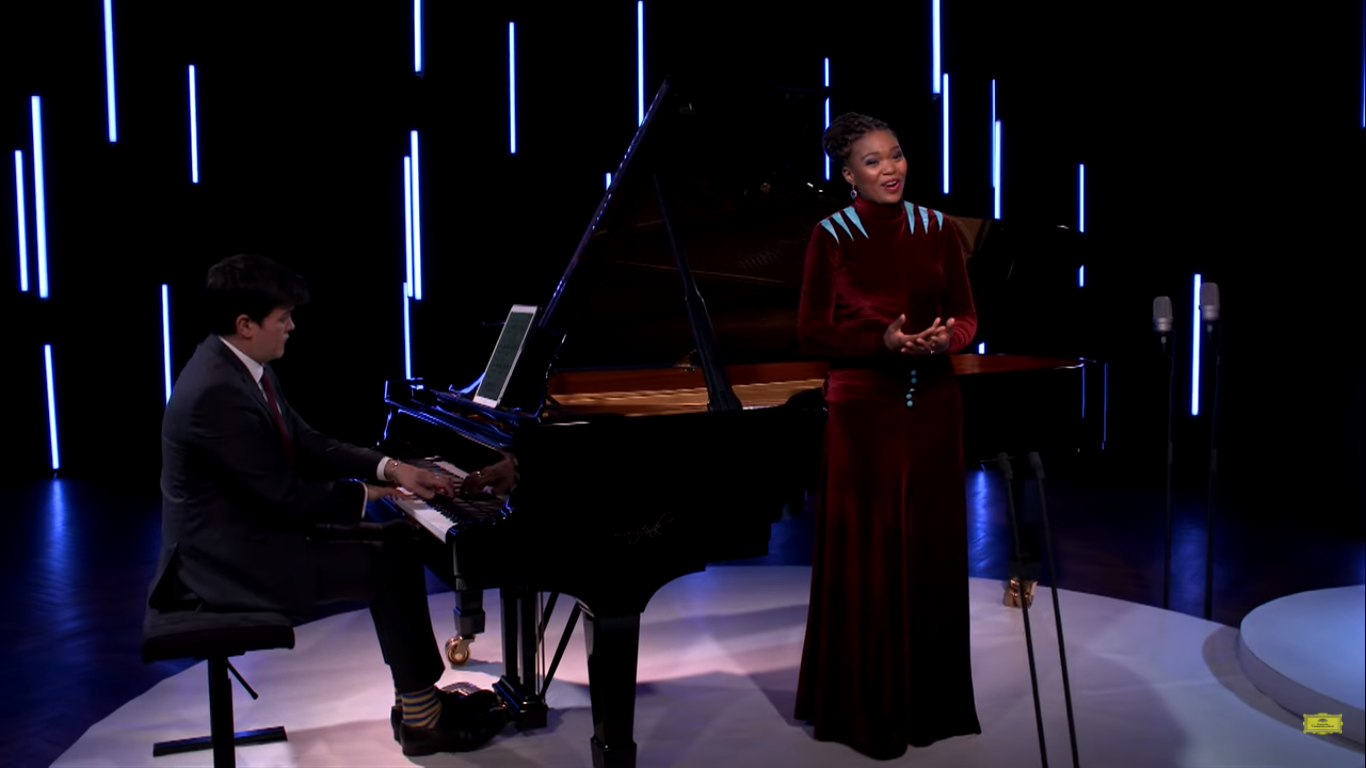 Germany Hahn, Fauré, Obradors, Puccini, Dvořák: Pumeza Matshikiza (soprano), James Baillieu (piano). Recorded in Berlin from Tanzaal an der Panke. Streamed via DG Stage (click here) on 19.2.2021. (CC)
Germany Hahn, Fauré, Obradors, Puccini, Dvořák: Pumeza Matshikiza (soprano), James Baillieu (piano). Recorded in Berlin from Tanzaal an der Panke. Streamed via DG Stage (click here) on 19.2.2021. (CC)

Hahn – Venezia (1901)
Fauré – Trois Mélodies (1878), Op.18 Nos.3 (Automne) and 1 (Nell); Poème d’un jour (1878), Op.21 No.2 (Toujours); Three Songs (1871), Op.8 No.1 (Au bord de l’eau)
Obradors – Canciones clásicas españolas, Volume I (1921)
Puccini – Madama Butterfly (1904-7): ‘Un bel dì vedremo’; Tosca (1900): ‘Vissi d’arte’
Dvořák – Rusalka (1901): ‘Song to the Moon’
Part of DG Stage’s ‘Musical Moments’ series, this concert offered an opportunity to hear the rising South African opera star Pumeza Matshikiza; her debut album, Voice of Hope was released in 2014 on Decca Classics; in May 2016 she released a disc simply entitled Arias.
Matshikiza’s US debut was as Mimì (La bohème) at Dallas Opera; her debut at La Scala was with a new work, playing Eve in Giorgio Battistelli’s CO2. She was a member of the ensemble at Stuttgart for five years, where her roles included Ännchen (Der Freischütz), Zerlina (Don Giovanni) and Pamina (Die Zauberflöte). She studied at the University of Cape Town and then at the Royal College of Music in London; she went on to join the famous Jette Parker Young Artists Programme at Covent Garden from 2007-2009.
This was an hour-long recital that yet encompassed worlds. Hahn’s Venezia is a set of six songs in Venetian dialect on varied aspects of love, ‘and just enjoying your life’, as Matshikiza says in a short introduction she inserted between songs. ‘Sopra l’acqua indormenzada’ is to a text by Pietro Pagello; Matshikiza phrases smoothly and charmingly. ‘La Barchetta’ (text Pietro Buratti) has a watery piano part; and both Matshikiza and Baillieu captured the ‘languido’ instruction perfectly; vocal melismas revealed superb technique. Third is ‘L’avertimento’ (Buratti) more agile and calling on Matshikiza’s lower register while ‘La Biondina in Gondoleta’ (text Antonio Lamberti) is a gloriously flowing Andantino with an appealing piano postlude; Baillieu is so sensitive here. ‘Che pecà’ (Francesco Dall’Ongaro) is a strophic song of charm; the piano part is simple, staccato chords; the melodic line has all the interest it needs. Matshikiza is a real storyteller too, and this song really shows that off. ‘La primavera’ (Alvise Cigogna) has a tricky piano part, perfectly scaled by Baillieu (he conjures a lovely bell-like treble too). Characterisation from both musicians was superb throughout.
Matshikiza began her Fauré set with the third song of Op.18 (to a poem by Armand Silvestre), the clouded skies of the opening alleviated by a glorious ray of light initiated by Baillieu in the song’s central ‘B’ section. The song ‘Nell’ is to a text by the splendidly named Charles-Marie-René Leconte de Lisle – a text itself inspired by Robert Burns. Matshikiza’s burnished soprano is perfect for this song, with not a touch or harshness to mar the upper registers. We move to Poème d’un jour, Op.21, a story of a love affair that exists within one single day. This being poetry, this is no Tinder hook-up; charm, passion, and close relationship are all explored. Matshikiza’s melodic line is truly impassioned, with a side-order of impetuosity. Finally, for this bouquet of Fauré, the perfect tempo choice for ‘Au bord de l’eau’ (Andante quasi allegretto) allows for the gentle ebb and flow of the song to unfold. Matshikiza’s voice seems perfectly even without a hint of a break; her tonal lustre graces the song’s entire range; snippets of duet with voice and piano right-hand glisten. French chanson feels very much like home turf for Matshikiza.
Barcelona-born Fernando Obradors (1897-1945) wrote four volumes of classic Spanish poetry between 1921 and 1941. Like Hahn’s Venezia, Obradors’s set of songs examines love from a variety of angles. ‘La mi sola, Laureola’ to a poem by Juan Ponce seems to carry a weight on its shoulders, at times alternating a lonely vocal refrain with solo piano, while ‘Al amor’ (Cristobal de Castillejo) is vibrant in its rhythms and spicy harmonies. Lovely to hear the detail of the piano part from Baillieu while Matshikiza sails resplendently above. The anonymous text to ‘Corazón, porqué pasáis’ is set with aplomb by Obradors; Baillieu’s playing is massively characterful, while is Matshikiza’s contribution beautifully caressing of the line. ‘El majo celoso’ (another anonymous text) offers charm; Matshikiza’s darkening of tone later most effective, and it balances the territory with wit to spare. But the Summer heat-haze of ‘Con amores, la mi madre’ (Joan Anchieta) was possibly the most memorable song of the set in its sophistication. For sheer beauty, the penultimate ‘Del cabello más sutil’ takes some beating before the folk song ‘Chiquitita la Novia’, its piano part ‘quasi guitarra’ leaving us in no doubt as to the geographical origins of this music. Together Baillieu and Matshikiza constitute one story-telling entity; one feels that whatever the repertoire, one would be gripped. Their move from France to Spain was beautifully managed, each perfectly evoked.
Hearing Puccini’s ‘Un bel dì’ (Madama Butterfly) with piano does rather diminish the music somewhat, while throwing into relief the sheer emotive importance of Puccini’s orchestration. It is particularly difficult to convey the intensity of chords that lack bass solidity on the piano. Yet as a showcase for Matshikiza, one does hanker to see her in the theatre (although frankly at the moment it would be good to see anyone in a theatre). Again, intensity and storytelling were key to Matshikiza’s success. ‘Vissi d’arte’ from Tosca followed and Puccini’s long vocal lines delivered with excellent legato; but more, she lived the moment.
One of Matshikiza’s signature roles is that of Rusalka in Dvořák’s opera of that name: her performance at the beautiful Opéra National du Rhin was reviewed by my colleague Rick Perdian here (she has sung it three times live) while Jack Buckley caught her in Francesconi and Beethoven in Rome with Antonio Pappano (here). Now we heard the miraculous ‘Song to the Moon’, this is, again, music Matshikiza excels in. Here, it is easier to forget the piano reduction and revel in the opera’s atmosphere (some expert work with the sustaining pedal from Baillieu, in fairness, helped). Rather nice to have two works from 1901 both at the beginning and the end of the recital.

A final, fairly flippant, word for Baillieu’s stripey socks; they have so much character maybe they should have their own Twitter account? Seriously though, Baillieu confirmed himself as one of the foremost piano accompanists active today. But when it comes to Matshikiza, she is a real talent; I look forward to seeing her live. One fine day, as Butterfly would say.
We did get some South African encores: Malaika (a Tanzanian love song sung in Swahili) and the Xhosa (the word itself begins with a ‘click’) Click Song (Qongqothwane), both well-known through the great Miriam Makeba. The ‘Alveolar click’ is a region-specific characteristic sound; it is even more astonishing to hear it heard sung (interestingly, there is a parallel to the sung ‘r’ with a háček [‘ř’] in Czech, given we just heard a bit of Rusalka). Great fun all round.
Colin Clarke
